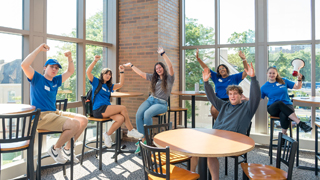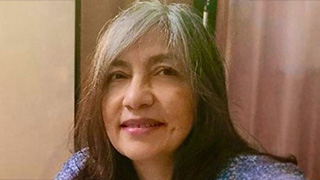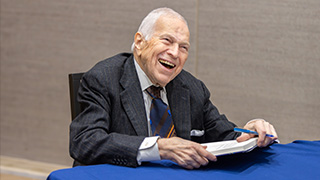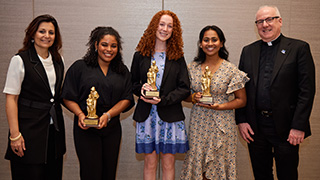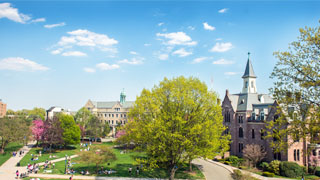WSOU Celebrates Nurses Week with College of Nursing Guests
Wednesday, May 11th, 2022
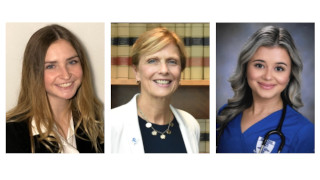
On Saturday, April 30, the show welcomed College of Nursing Clinical Assistant Professor Katherine Connolly, D.N.P., RN, APN-C and students Patricia Esposito and Colleen Osbahr in honor of National Nurses Week.
"The purpose of the show," said Cellini, "is to inspire the audience to take personal responsibility for your professional satisfaction. We want to provide you hope, healing and peace in these unprecedented turbulent, uncertain times and motivate you to search deep inside yourself in the quest for fulfillment."
Connolly is a faculty member in the undergraduate department and the associate director of the College of Nursing's Buccino Leadership Institute. Connolly also practices as a nurse practitioner in the Robert Wood Johnson Barnabas health system on the Somerset campus.
Patricia Esposito is a senior nursing student and a member of the Buccino leadership Institute and will be graduating this May. In fall 2021, she and Connolly helped organize an alumni event "Celebrating Seton Hall's Frontline Nurses" and served as master of ceremonies.
Colleen Osbahr is a junior nursing student and also a member of the Buccino leadership Institute. After attending the alumni event in the fall, Colleen was inspired to raise awareness about the nurses experiencing post-traumatic stress disorder (PTSD) related to the COVID 19 pandemic and took on this topic for her nursing leadership project.
Here are some highlights from the interview:
Cellini: Kathy having worked as a nurse practitioner in the hospital during the pandemic,
what effect do you think this did goal time has had on the nursing profession?
Connolly: At the outset of the pandemic, I have to say that the nursing profession was completely blindsided. What went on behind the closed doors in those hospitals is really something that you can't even put into words. Patients were left without the advocacy and support of their family members, and it was nurses who had to stand in that gap. If you would ask most nurses, they would probably agree that that was probably one of the most heart wrenching aspects of the pandemic.
One of the positive things that came out of the crisis was it raised our awareness to the importance of the team. Everyone had an important role to play, from the hospital leadership to every single person working in that hospital on any given day. It's important for people to understand that the effects of the pandemic have left the workforce tired and depleted. Young people coming into the profession have really stepped up. The encouraging thing is that despite all that has happened, people are still choosing nursing as a career path.
Cellini: Patricia, now you are a senior nursing student, and you spent two years of your clinical training under the restrictions of this pandemic. What was this like for you and your peers?
Esposito: We were fortunate enough to be able to experience our clinical training in the hospitals, even during the pandemic. In the beginning, it was honestly terrifying being in the war zone with other nurses while the unknowns of COVID existed. Nonetheless, we were able to immerse ourselves into a learning experience like no other and understand the depths of nursing beyond the typical scope. It was during this time — when I witnessed the dedication and perseverance of the nurses around me — that I realized what a special profession nursing truly is.
Cellini: You were instrumental in hosting a very special event to honor alumni nurses who served on the frontline during the pandemic. Can you tell us what inspired you to organize such an event?
Esposito: My true inspiration behind [organizing] this event was the fact that while the rest of the world stayed home, our nurses went to work day after day, fighting the pandemic. The strength, courage, determination and tenacity that nurses demonstrated during one of the most devastating times in our world needed to be honored and still deserves even more recognition.
Cellini: Colleen, you were inspired to do a project looking at PTSD and to raise awareness about what nurses are going through during the pandemic.
Osbahr: My junior leadership project is about PTSD and nurses who worked throughout COVID. While attending the event Patricia helped host, I listened to some of the nurses that spoke, and while they had really inspiring stories, I was very shocked to hear how stressful and traumatic their experiences actually were. I wanted to bring awareness to that because the average person has no idea what's going on in the hospital behind the behind closed doors, and also give them a voice to talk about their PTSD symptoms and how their mental health was affected.
Cellini: What type of settings were the nurses you interviewed working in during the pandemic who were subsequently diagnosed with PTSD and how did you find them?
Osbahr: Dr. Connolly helped me find these nurses. most of whom were working in ICUs. One of them was in an oncology cancer unit, but they transferred her to a COVID unit because they need someone. They were so understaffed that they were just sending people to COVID units when they were originally supposed to work in another specialty.
Cellini: Kathy, how did you know of so many nurses going through these challenges?
Connolly: I was actually shocked myself that so many nurses were really going through so much. I'm a nurse educator at Seton Hall and I only worked a couple times a week during the pandemic at the hospital. I was astonished to find out that many nurses were suffering from PTSD.
Cellini: Colleen, what did you find were some of the most common symptoms?
Osbahr: A lot of them would feel guilty going out because they thought they were going to spread COVID. Some were unable to properly take care of themselves because they were just so anxious and shocked. They would not be able to sleep and eat as well or drink as well as they normally would. Others were constantly worried, angry. Some of them that shocked me were typical PTSD symptoms like flashbacks. They would sometimes hear alarms and call bells when they're trying to sleep because they were just constantly going when they were working. Two of the nurses I talked two actually were diagnosed by their psychiatrist with PTSD and they all worked through it.
Cellini: What did these nurses feel that the institutions could do to facilitate coping among nurses and other healthcare providers who were going through this?
Osbahr: They thought there was a disconnect or kind of divide or mistrust between the nurses and the facilities because they [felt let down] by not being prepared with enough protection, like PPE. They would like the institutions to listen to them more and plan for future pandemics. They also said that they think the hospitals could offer more resources for support and mental health like therapy, exercise classes, or just ways that they can find something that works for them. Like an outlet that's personalized.
Cellini: What's the most important thing they want people to know, what was the overall message to the rest of us?
Osbahr: if you know a nurse, especially a bedside nurse who has been working throughout the pandemic, just check in on them and see how they're doing. If you're working as a nurse, you have to have boundaries and stick to them with how much you're going work. Self-care is not selfish.
Cellini: Patricia, as a senior, you're about to join the nursing workforce. What does National Nurses Week mean to you?
Esposito: I am truly honored and humbled to be joining the workforce especially after these challenging four years of studying throughout the pandemic I learned to never give up even in the midst of pure darkness and to remember why I started, which is to make a difference in the lives I come across.
Listen to the full podcast here.
Categories: Health and Medicine

